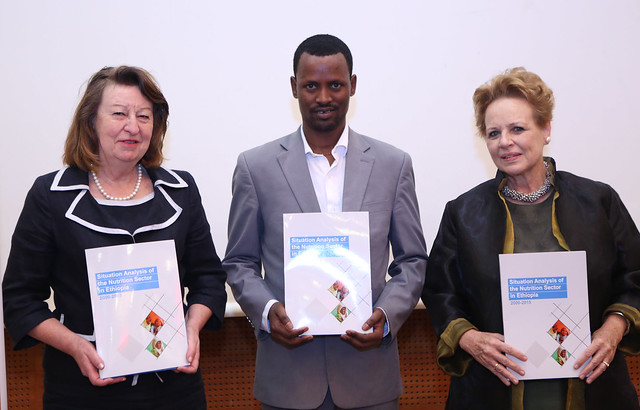
In recent years, the global momentum on nutrition has been growing rapidly. The Scaling-Up Nutrition Movement has united world leaders and brought the UN, governments, civil society and the private sector together in a collective effort to improve nutrition through shared goals and resources to effectively scale up nutrition policies and programmes.
Ethiopia’s continued reduction of extreme poverty and chronic malnutrition has received international recognition and continues to inspire the international community to remain ambitious in the level of progress it aims to achieve.
Today, 10 March 2016, a document entitled Situation Analysis of the Nutrition Sector in Ethiopia from 2000-2015 was launched which was made possible through funding provided by the European Union to UNICEF, as part of the EU+ Joint Cooperation Strategy for Ethiopia, which aims to ensure a coherent and consistent response to Ethiopia’s development challenges.
Speaking at the launch of the situation analysis, Ms. Chantal Hebberecht, Ambassador of the European Union said, “The study has synthesised the trend and causal analysis of undernutrition, mapping of nutrition specific and sensitive interventions and gap and opportunity analysis. In so doing, it has tried to provide evidence based guidance for future nutrition related policies and interventions in the country.”
As the world embarks on a new sustainable development agenda, the Government of Ethiopia and its development partners can look back on the 15 years of remarkable progress in the Nutrition sector through this Situation Analysis document that we are launching here today. The findings of the Situation Analysis provide evidence of a steady and substantial improvement in stunting over the last 15 years in Ethiopia where the stunting prevalence has dropped from 57 percent to 40 percent. At the same time, food consumption and expenditure have increased on average from about 2,200 calories per household per day in the year 2000 to 2,450 calories per household per day in 2011.
UNICEF applauds the achievements made and the strong commitment of the Government of Ethiopia to improve the nutritional status among children and women, encouraging continued development and expansion of policies and programmes for nutrition interventions. However, there is still a long way to go and the eradication of undernutrition among children and women will require multi-sectoral efforts to ensure a more equitable and sustainable impact.
The report highlights critical gaps in terms of existing policies and programmes which we must address urgently to accelerate nutrition results for women and children.
Some of the key findings of the situation analysis report includes; educating mothers as key factor for improving nutrition, high risk factors for child stunting associated with poor water supply and sanitation and the need to improve production diversity, nutrition knowledge and women’s’ empowerment by making sure that diverse and nutritious foods are available and accessible at all times. In addition, the study highlights the need to expand existing nutrition programmes to improve undernutrition in the Developing Regional States (DRS) with increased resources and improved targeting.
These findings from the situation analysis will be key to inform programming for a wide range of nutrition specific and nutrition-sensitive stakeholders in Ethiopia. The findings will feed into the second National Nutrition Programme (2015-2020), which targets to reduce child stunting prevalence to 26 percent by 2020, as well as the second Agricultural Growth Programme which strives to increase agricultural productivity with a ‘nutrition lens’.
The recommendations in the situation analysis will help support the Government in the realisation of the Growth and Transformation Plan 2 and the achievement of the Seqota Declaration to make undernutrition, in particular child undernutrition, a history in Ethiopia.
Malnutrition is one of the greatest symptoms of injustice and inequality that we are fighting in Ethiopia today. By accelerating our joint nutrition interventions, we can transform the lives of millions of children to become healthy citizens and reach their full potential with their hopes and opportunities restored.